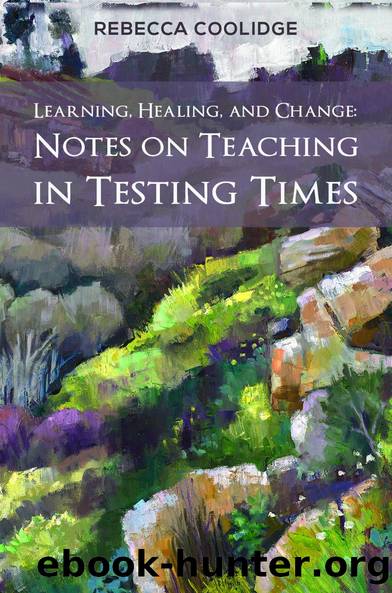Learning, Healing, and Change: Notes on Teaching in Testing Times by Rebecca Coolidge

Author:Rebecca Coolidge [Coolidge, Rebecca]
Language: eng
Format: epub
Tags: Social Science, Children's Studies
ISBN: 9781643783505
Google: qXMKzgEACAAJ
Barnesnoble:
Publisher: AUSTIN MACAULEY
Published: 2020-11-15T02:50:55+00:00
Integrative work is considered a great aid for the disorganization that occurs in a system which has been traumatized by injury. It allows the different parts which need to work together to become aware of the dysfunction caused by the traumatic event. Maybe, for example, a muscle became torn and weakened, so other muscles started compensating, which pulled on and irritated other muscles near those. A lot of neuro-muscular work is already integrative to begin with: compressing neighboring affected areas at the same time, and allowing them to move together or separately as they need to. The âreprogrammingâ part of neuro-muscular reprogramming refers to this healing ability that the body has of taking inventory and reorganizing itself into a state of balance.
Of course our mind and emotions can become scattered and disorganized as well, with our thoughts or feelings out of sync with each other. We have probably all experienced problems remembering and making important connections under stress, especially when we have too much going on in our lives: âWhy didnât I think to mention just now to Pasha that Sasha has been needing exactly the kind of help that she just offered?â At times like this, our mind needs R & R (Rest and Recreation, something even the Army leadership understands!) It needs some time to integrate, some Down Time, in the very least, spent sleeping or just relaxing.
In education as in body work (where we are educating or re-educating the body), it is considered good practice to allow what was learned in one area to mingle with what was learned in other areas rather than staying in its own bubble. Teachers often introduce and close a lesson with âbroad strokes:â connecting the lesson with other material and discussing its relevance to other subjects. More learning for the students often happens after a class lesson when all the ideasâones recently taught as well as ones already out thereâhave a chance to meld. This helps the new learning sink in. Reflection is an invaluable kind of integrative activity. I heard at an education workshop once that if we ask students to reflect on a lesson at the end of it, the amount of learning that they take away just about triples. Free play can also be a great way of reflecting on and integrating material.
Download
This site does not store any files on its server. We only index and link to content provided by other sites. Please contact the content providers to delete copyright contents if any and email us, we'll remove relevant links or contents immediately.
Cecilia; Or, Memoirs of an Heiress — Volume 1 by Fanny Burney(32558)
The Great Music City by Andrea Baker(32019)
Cecilia; Or, Memoirs of an Heiress — Volume 2 by Fanny Burney(31956)
Cecilia; Or, Memoirs of an Heiress — Volume 3 by Fanny Burney(31942)
We're Going to Need More Wine by Gabrielle Union(19046)
All the Missing Girls by Megan Miranda(16030)
Pimp by Iceberg Slim(14508)
For the Love of Europe by Rick Steves(14121)
Bombshells: Glamour Girls of a Lifetime by Sullivan Steve(14077)
Talking to Strangers by Malcolm Gladwell(13370)
Norse Mythology by Gaiman Neil(13367)
Fifty Shades Freed by E L James(13243)
Mindhunter: Inside the FBI's Elite Serial Crime Unit by John E. Douglas & Mark Olshaker(9344)
Crazy Rich Asians by Kevin Kwan(9292)
The Lost Art of Listening by Michael P. Nichols(7506)
Enlightenment Now: The Case for Reason, Science, Humanism, and Progress by Steven Pinker(7314)
The Four Agreements by Don Miguel Ruiz(6765)
Bad Blood by John Carreyrou(6622)
Weapons of Math Destruction by Cathy O'Neil(6281)
